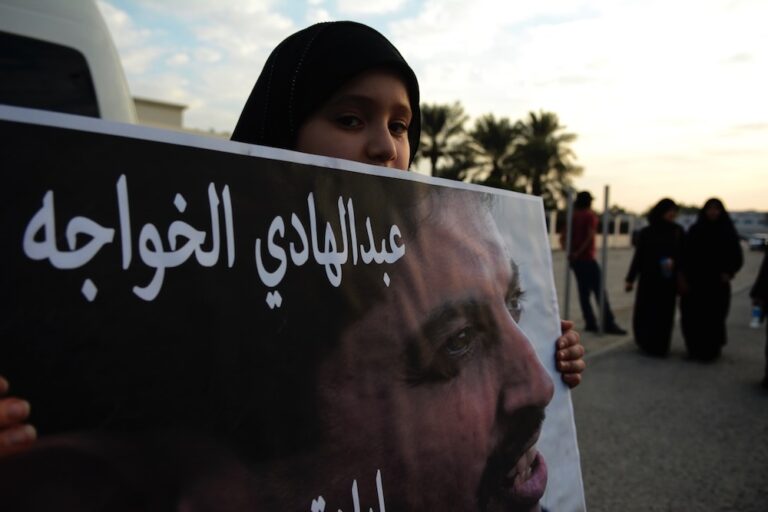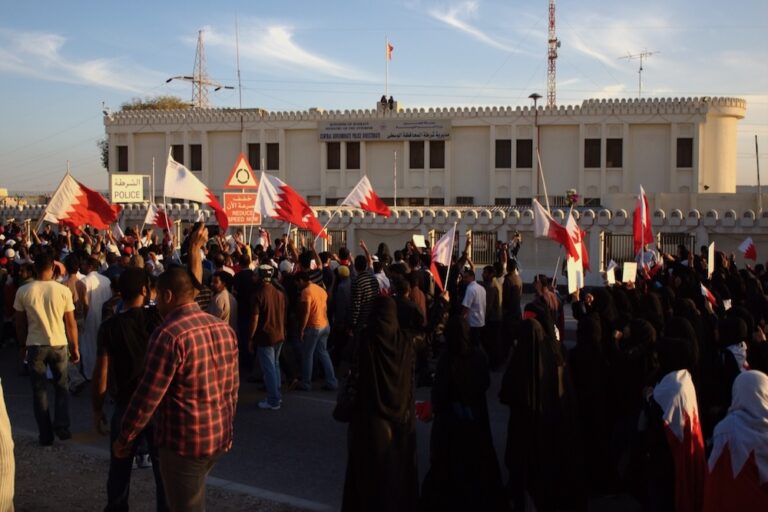Some of the BICI’s most serious concerns, like accountability for crimes such as torture and relief for people wrongly imprisoned have not been adequately addressed, says Human Rights Watch.
(Human Rights Watch/IFEX) – Beirut, March 28, 2012 – Bahrain’s government has not carried out critical recommendations by the independent commission that looked into extensive human rights violations during the crackdown on pro-democracy protesters in 2011, Human Rights Watch said today.
The Bahrain Independent Commission of Inquiry (BICI), established by King Hamad bin Isa Al Khalifa and headed by the Egyptian-American jurist Cherif Bassiouni, issued its findings in November 2011. The king promised at the time to carry out all of its recommendations and established a National Commission to monitor the process. That body reported on March 20, 2012, that the implementation of the BICI’s recommendations had been “comprehensive and far reaching” and “touched all aspects of Bahraini life.” But some of the BICI’s most serious concerns, like accountability for crimes such as torture and relief for people wrongly imprisoned, were not adequately addressed, Human Rights Watch said.
“Bahrain has taken some positive steps, but the Bahraini authorities can hardly claim that the BICI’s recommendations have been implemented as long as hundreds of people remain behind bars solely for speaking out and demanding a change of government,” said Joe Stork, deputy Middle East director at Human Rights Watch. “And it seems that no high-ranking officials have been investigated for their roles in rampant torture or unlawful killings.”
In one positive step recommended by the BICI, the government stripped the National Security Agency (NSA) of authority to arrest and detain people. The king replaced Shaikh Khalifa bin Abdullah Al Khalifa as head of the agency, but then in a disturbing move promoted him to secretary general of the Supreme Defense Council and a national security adviser to the king with ministerial rank.
The BICI report found that the NSA played a major role in the arrests of 2,929 people during the 10-week state of emergency, from mid-March until early June last year, typically in nighttime raids on homes. Its report said that NSA and other security forces “intentionally broke down doors, forcibly entered and sometimes ransacked the houses,” used “sectarian insults and verbal abuses,” and humiliated relatives and terrified children of those targeted. It said that the pattern of the arrests showed the “existence of an operational plan” that was “designed to inspire terror” among those targeted for arrest.
The BICI concluded that the arrests and detentions carried out during the state of emergency “could not have happened without the knowledge of higher echelons of the command structure” of the security forces. It also reported that “a large number” of the 179 detainees held by the NSA alleged that they had been subjected to torture.
“The appropriate government response would have been to suspend Al Khalifa pending investigation of his role as head of the NSA during the crackdown,” Stork said. “Rewarding him with a ministerial position illustrates the ruling family’s failure to take seriously the need for accountability at all levels for human rights crimes.”
The BICI called on the government to address allegations of torture by security forces “including those in the chain of command, military and civilian.” The government has initiated prosecutions of several security officers in connection with deaths in custody from torture and possible unlawful killings. But Human Rights Watch knows of no efforts to hold accountable high-ranking officials who presided over what the BICI report termed a “culture of impunity.”
On a related matter, the National Commission’s report said that the government has developed a code of conduct for police in line with international standards, instituted training programs “across the security services to embed respect for human rights and due process,” transferred investigations into torture allegations from the Interior Ministry to the Public Prosecution Office, and set up a “special investigations unit” in the Public Prosecution Office to investigate “unlawful or negligent acts that resulted in deaths, torture and mistreatment of civilians.” This followed on a recommendation by five international lawyers the government had engaged to advise it on implementing the BICI recommendations.
Human Rights Watch questioned whether the decision to place the investigations assignment in the hands of the Public Prosecution Office would in fact meet “the requirements of independence, impartiality and effectiveness” specified by the international advisors unless that office is fundamentally reformed to make it, in practice, independent of the government and committed to comprehensive and impartial accountability. In several reports Human Rights Watch has documented the persistent failure of that office to investigate serious allegations of torture and ill-treatment and to order independent medical examinations of detainees making such allegations. The Public Prosecution Office readily based prosecutions on confessions that were proven to be coerced. The BICI report, for its part, said that it “received evidence indicating that, in some cases, judicial and prosecutorial personnel may have implicitly condoned” the lack of accountability.
Bahrain’s attorney general announced that the investigations unit would be led by “an individual holding the rank of Head Prosecutor” and staffed by “7 prosecutors drawn from the Public Prosecution,” but none of these people have yet been identified by name. In a separate letter to Human Rights Watch, the attorney general wrote that “nothing precludes taking measures against any official proven to have been involved in these events, regardless of his occupation or rank.”
According to the attorney general, in the wake of the BICI report the public prosecutor is investigating complaints against 50 officers for their alleged involvement in 107 cases involving torture and mistreatment of civilians, including several deaths in custody and wrongful killings. A police lieutenant is the highest-ranking official among those being prosecuted, according to news reports, with most of the remainder being non-Bahraini low-ranking Interior Ministry employees.
The authorities’ failure so far to prosecute those responsible for serious human rights violations regardless of rank undermines Bahrain’s commitment to a meaningful reform, Human Rights Watch said.
Other key BICI recommendations not yet implemented are to carry out a comprehensive review of court sentences imposed for speech crimes and to void convictions imposed after grossly unfair trials.
(. . .)


